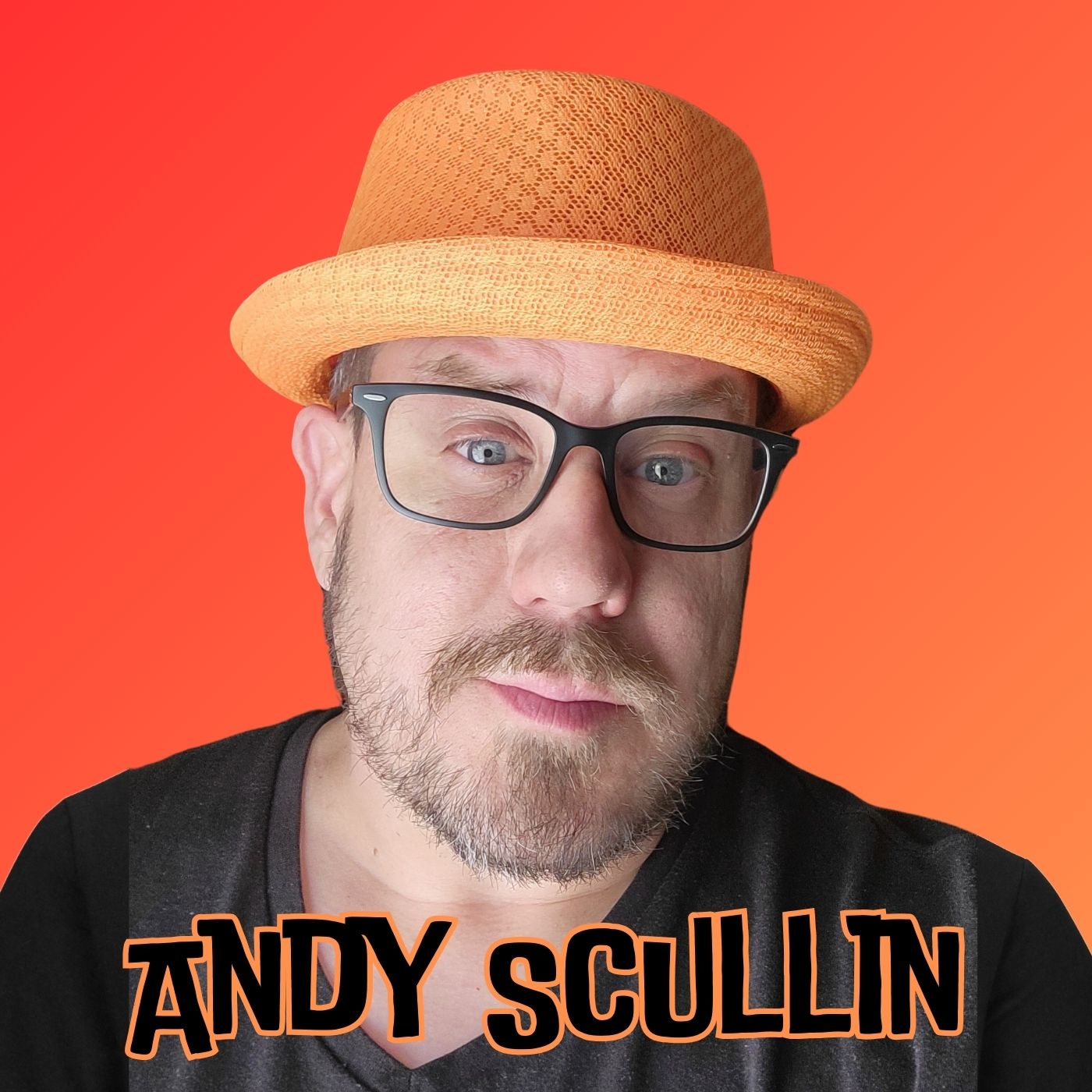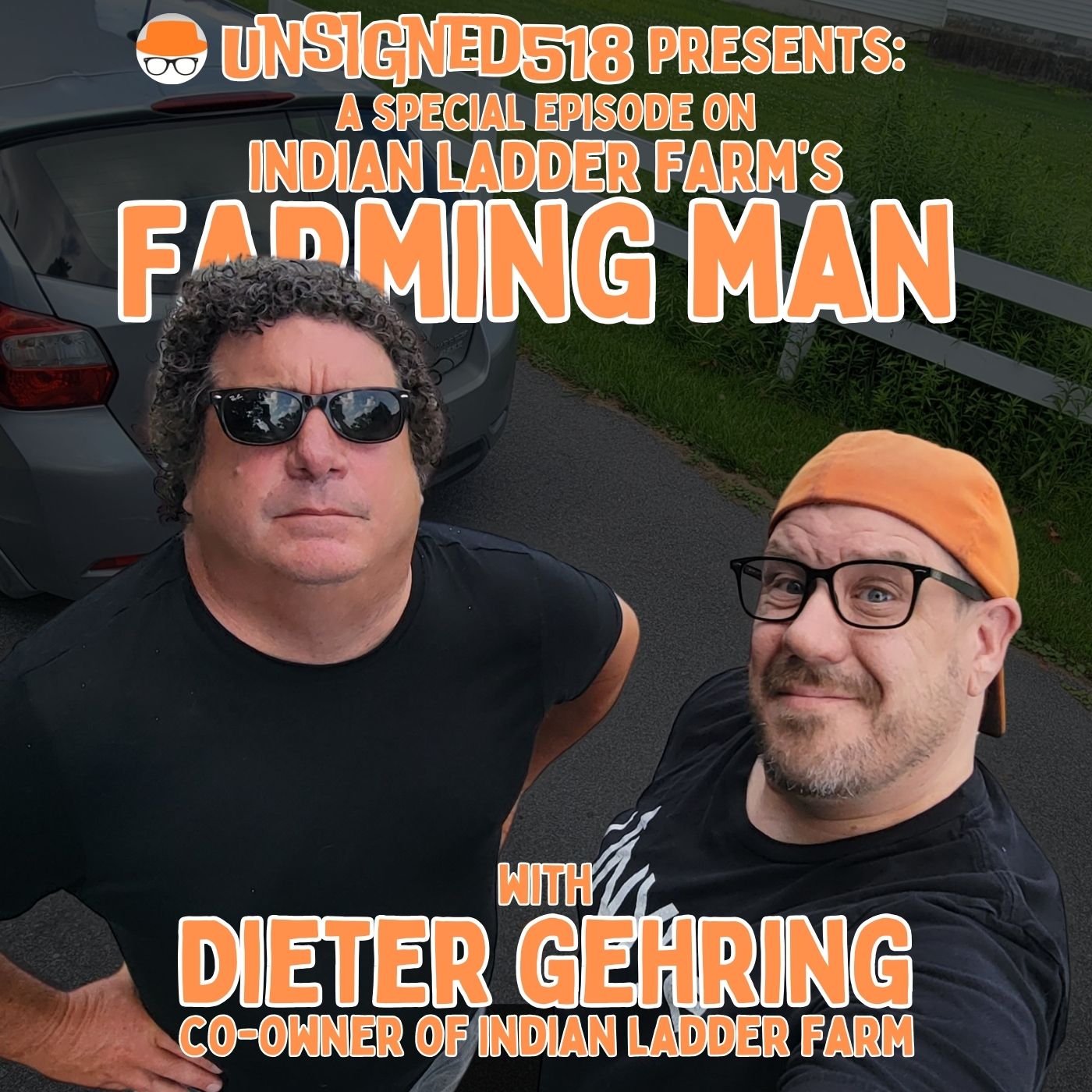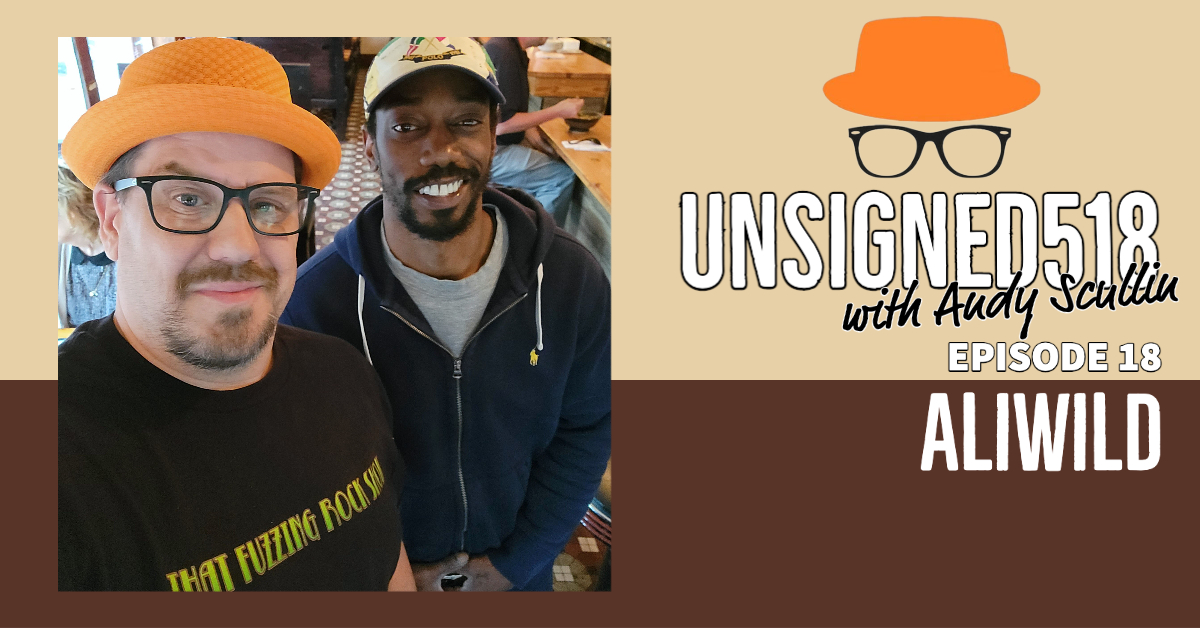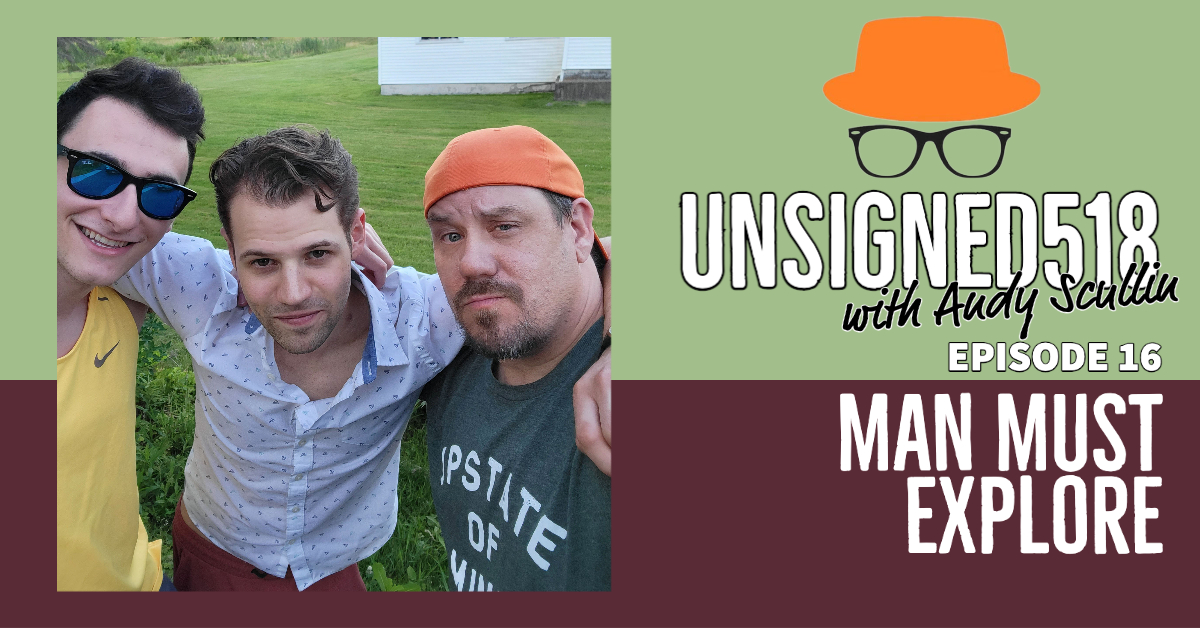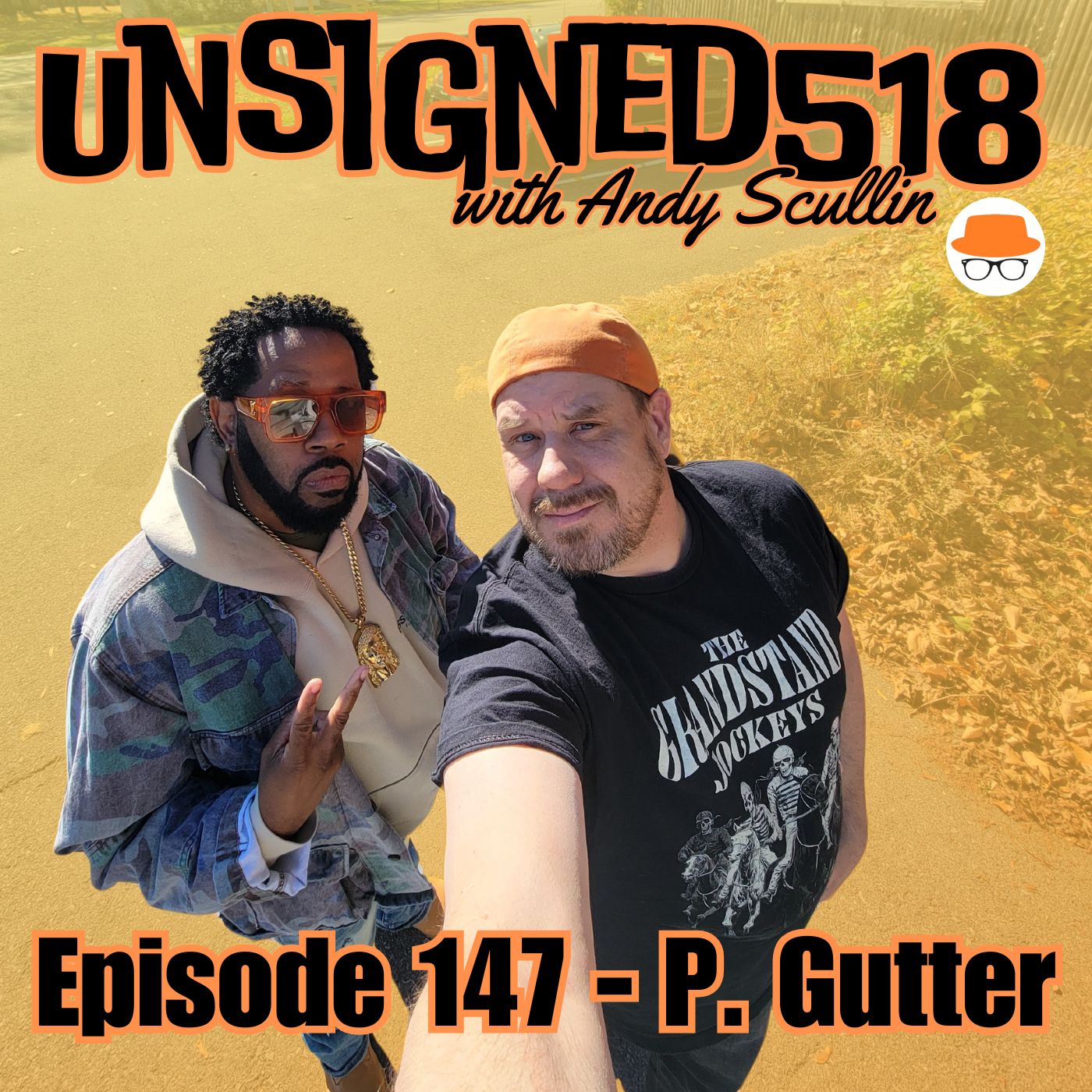[00:00:01] Speaker A: He was born on a Saturday in 73. He loves park rock music. Finding the 13 in the dazzle roll now on the Ben's guitar with a short with radio back his motherfucking Andy scolding look at motherfucker. Cause here he comes. Andy.
[00:00:26] Speaker B: Welcome to Unsigned 518. We are here with the first of three special episodes that are going to be dropping throughout the month of July, all pertaining to local music festivals. And we will get to the music festival portion later. But I am here with Dieter of indian ladder Farms, who is actually one of the owners of indian ladder farm. So I guess before we get into farming, man, and the events that are going down this weekend, I guess you want to tell a little bit of the story of indian ladder farms in general.
[00:01:00] Speaker C: Well, indian ladder Farms in general, yeah. So indian ladder Farms is a fifth generation farm. My son's now the fifth generation on the farm, so it's been in my wife's family for 108 years now. And my partner and I, Stuart Morris, decided to start a brewery back in 2014, 2014, kind of add to the farm experience, let's say the farm has gone through many not, I guess, major changes, but more additions over the years.
[00:01:47] Speaker B: And it's been a working farm.
[00:01:49] Speaker C: It's been a working farm the entire time from my wife's great great grandfather when he started. It started out as a dairy farm, then became a beef farm, then became an apple orchard. It's been orchard now for a very long time.
So we're getting kind of surrounded down there in Albany county. We're one of the. There are not a lot of farms left in Albany county at this point, but we are literally 20 minutes from downtown, so we're pretty close to the city, as you know, a farm would go.
And we decided to grow hops about twelve years ago, discovered that hops were not going to really be a commodity crop for the farm.
[00:02:40] Speaker B: And was it a plan to, like, grow the hops and then sell them?
[00:02:43] Speaker C: We were going to sell them to other breweries and always had been involved with craft beer and worked for Bill Newman way back in the day.
Have always been interested in craft beer, been a homebrewer. Well, I've been a homebrewer up until I started a brewery.
And, yeah, so we were going to grow hops to be kind of involved and discovered that that was not going to pay the bills. It was about that time that the New York state launched the farm brewery law.
So we thought, well, we're already kind of an agro tourism place with the pick your own and the donuts and all the other things we do. We have educational programs on the farm, barn, school and so on. So we decided, well, let's start the process of getting a brewery going.
Our license allows us to make cider as well, so it seemed like a no brainer. We're already growing apples, so let's make cider, too.
So now we are in our 8th year brewing and fermenting, and have professional brewers and professional cider makers. I say makers and brewers actually only have one of each.
[00:04:08] Speaker B: Is there much of it just from my own personal curiosity, like making cider and brewing beer? Is that something that's done in the same facility, or is it something that kind of has to be completed separate? Because I know, like, apples are.
[00:04:23] Speaker C: Well, it's funny that you should mention that, because we sort of set a precedent. When we opened our facility, it took us two years to get our federal production license, because they don't like cider and beer making the same facilities.
So we sort of broke the ice on that. Now, you can do that.
But once we did that, we. Now we make it in separate facilities.
We have a cidery and we have a separate brewery.
[00:04:56] Speaker B: But, you know, people should have the choice.
You made that out.
[00:05:01] Speaker C: It all has to do with taxation and so on. Cider is taxed at a different rate than beer is, and one shall not cross the other's boundary and so on. But, yeah, so we. We have a separate brewery facility and we have separate cider facility.
[00:05:17] Speaker B: That's great. And that was. You said 2014 is when you started doing both?
[00:05:22] Speaker C: No, 2014 is kind of when we started getting the paperwork in to get everything. We actually didn't get licensed until 2016. It took that long for us.
[00:05:33] Speaker B: That's why I was saying, because I used to make cold pressed juice, and the apples I remember were just like.
They were scrutinized more heavily than anything else.
[00:05:46] Speaker C: Kind of amazing. When you get into the production side of things there. Cider has a lot more rules than beer, right?
[00:05:54] Speaker B: I bet. And apples have more rules than literally, like cucumbers or celery.
[00:05:59] Speaker C: Oh, yeah, whatever.
[00:06:01] Speaker B: They're like apples.
[00:06:02] Speaker C: We have to follow a lot of state and federal protocols for safety and cleanliness and all those things.
[00:06:11] Speaker B: Yeah, yeah. It's a. I mean, it. You know, it's, I guess for the. For the good of safety, but I just remember, like, the red tape that it took.
[00:06:19] Speaker C: Yeah, you sort of, you know, you have to remember that. As bizarre as a rule might be, it's usually because somebody did something stupid.
[00:06:28] Speaker B: Right, right.
[00:06:30] Speaker C: Someone else screwed it up for you.
[00:06:33] Speaker B: Yeah. I always think that, like, whenever I see, like, an asinine sign somewhere, you know what I mean? When you're like, hmm, somebody. Somebody did something weird.
[00:06:41] Speaker C: Somebody got hurt.
[00:06:44] Speaker B: So a couple years, you know, a couple years to get the paperwork going. So then 2016 is when you were doing it.
[00:06:50] Speaker C: Yeah, we launched, and we were. We were a three quarter barrel brewery. And I don't know, I think we maybe had 20 totes of cider, you know, and didn't really know what we were doing much in the cider arena other than just wild fermentation and hoping for the best. And we didn't really have any cider fruit at that time. We've now planted, you know, we've now 15 acres of dedicated cider fruit. So we're really up the game quite a bit. And a couple years in, we hired professional brewer. Scott Veltman, was a veteran of Amagang for, I think, six years, and then the Albany pump station.
Local boy. So he grew up in Knox, not too far from the brewery. His parents still live there.
So he was excited to come on board, was excited about what we were doing, was being able to use local ingredients.
And then we hired cider maker Alex Gill, who does all of our cider production now.
He's doing a fantastic job, really, taking the.
Taking our cider production to another level with his enthusiasm.
[00:08:12] Speaker B: And for, like, you know, you were saying how New York State did the farm license. I mean, I don't know a ton about it, but, like, I don't know.
[00:08:20] Speaker C: If, you know, bound by fate, I'm stopping there after.
[00:08:23] Speaker B: Okay. Well, they're. They're friends of mine and my wife. My wife actually works there.
[00:08:28] Speaker C: Okay.
[00:08:29] Speaker B: But, like, you know, so I know that they're, you know, a farm brewery. Yeah, it's like. But I guess. Can you explain, like, what that means?
[00:08:37] Speaker C: So the farm brewery law, it's. Its intent is that you are to use New York state products. So you're supposed to use New York State barley malt. You're supposed to use New York state hops. And any adjuncts you use, if you're using fruit or anything like that, should be New York state for the cider. It has to be 100% New York state apples for the brewery. It's been a sliding scale, because when the law was put into place, there was really only about 50 acres of hops in the state, and there was hardly any barley production. There was only, you know, some mall houses coming online. Now we have a few mall houses that are able to supply us. So it started as had to be 20% and then it went to 60%, and then it's going to go to 90% at some point in the future.
[00:09:37] Speaker B: And that was basically based on the fact that they couldn't tell you to do 100% if there was.
[00:09:42] Speaker C: Exactly. Yeah, there wasn't. The supply chain was not there.
And so they were giving the farmers and the production. I mean, it's not just the farmers, you know. So when you, you can grow all the barley you want.
Barley for brewing is tricky in that it has to meet certain standards that regular feed barley for livestock doesn't have to meet.
Germ rate has to be extraordinarily high, so you don't get off flavors with hops. It was the same thing.
Not a lot of hops in the ground and not a lot of processing facilities. So, you know, we have our own hop processing. We grow hops on the farms. We grow about two and a half acres. So a lot of our beers are mostly our hops. We do.
There's certain hops we can't grow. So we look for certain flavor profiles. We have to get sometimes from New Zealand hops or west coast hops. But the law allows us to do that, is to supplement.
And we do sell some hops to other farms, but in order to do that, it's on the farmer to do all the post harvest. So one of the things that's kind of unique for our brewery is that we have a hop picker on site.
It was a $40,000 machine, came from Germany, sits in a barn, gets used a month out of the year. So we can go from essentially 20 minutes from will be from the time it leaves the field, gets picked and goes into the kiln to be dried. So we have an advantage there of having.
[00:11:38] Speaker B: And how, like, if we didn't have that machine, like, say it was all like, hand done, how long would that take?
[00:11:43] Speaker C: You can't do that.
[00:11:44] Speaker B: You can.
[00:11:44] Speaker C: No, not even. We did for a couple of years. We hand picked and, you know, we would have parties and, you know, by the third year, nobody answers the phone as a, you know, one. One mature bind, let's say. And they're called bines because of the way they grow.
Well, could be like 50 pounds and would take at least one man hour to pick. And so if you have two and a half acres, you have about 2500 plants.
[00:12:17] Speaker B: Jesus Christ.
[00:12:18] Speaker C: Yeah, so.
[00:12:20] Speaker B: And the machine will do the whole.
[00:12:22] Speaker C: Heidi can do. Heidi can do about a hundred an hour. We affectionately call her Heidi.
[00:12:27] Speaker B: Heidi, that's amazing. That's unreal.
[00:12:31] Speaker C: Yeah, she was. She's a trip. She was. 1974, German Wolf 100 4170 Harvester.
Came with no instructions.
We didn't know how to use it.
We had to reconfigure the electrical from 50 to 60 lot. And now after, this is going to be our 6th year in running Heidi that we're. If Heidi's making a bad noise, we pretty much know what it is at this point. Shut it down.
[00:13:07] Speaker B: Okay, so we, you know, we do want to talk about. There is a music event that is coming up tomorrow as this episode airs that we do want to talk about. So let's just take a quick break, and then we'll be right back with Dieter of indian ladder farms.
[00:13:26] Speaker A: Cold weather, dark sweater, you call me late at night weapon shield I see fields why did you start a fight?
How can I see if these were cutting glasses?
How can I see when these most have glasses?
If you want me like that I was fine before you burned on my matches now I'm color here I know I'm not a light oh, cold water, dark sweater you call me late at night white windshield, I see fields why did you start a fight?
Now I'm cold out here I know I'm not all lies now I'm cold out here I know I'm not all lies now I'm cold here I know I'm not all lies.
[00:15:46] Speaker B: That was rose colored glasses. Sidney Worthley and Sydney will actually be playing at farming man. You know, we are going to talk about, I guess, the origin story of farming man. But it's tomorrow and Sunday, there's two nights of music. Tomorrow we have the sugar hold, Sidney Worthley, tv doctors. And then Sunday we have wild adriatic and super 400. And Dieter, you were saying, like, it didn't start out as a music thing. It started out as something completely different, right?
[00:16:16] Speaker C: It started out as a very casual event. It started out at a conversation at other half brewery in Brooklyn. We were sitting around talking about how as brewers and breweries, people bring us beer, which is kind of. People want to share what they're doing, what we're making and stuff, you know, so we end up with like, a lot of other people's beer and or cider, and we're like, well, what are we gonna do with this? And it's like, well, let's have a camp out. And I said, well, we could have it at the farm, and we'll camp out like, yeah, we'll get some other breweries together and we'll all bring all these bottles and cans that, you know, people have gotten, and we'll bring some kegs and we'll just camp out. And so that was kind of the first two years of farming, man. It was like along my driveway in a field and, you know, we had a stereo and that was about it. And I was like, well, you know, maybe we should make this into something well, what? I guess we should make it into something bigger. Sort of came along because people that weren't in the industry, you know, when we opened, sort of caught wind of what we were doing and they wanted to be involved because it sounded like fun. And it's like, well, let's do something bigger. We've got this great big field out back and let's have music.
There's all this great local talent in the area, and several of the people that work at the brewery were all in bands. And so they were like, this will be really great.
And that's kind of how farming man developed over the last few years.
And it was the last few years it's been in this kind of remote section of the farm where we've had to bring all the infrastructure in from giant pull behind generators and building stages and light towers. And it just.
It got out of hand.
And so this year we're downsizing it a little bit. We're not downsizing it. In the number of breweries that are attending. We actually have more breweries and cideries and actually distillers coming this year than we ever had a. It is now two days, so it's only. It had only been Saturday.
Now it's Saturday and Sunday.
And we've built this great big facility on the farm that's finally open. It's called a pizza garden. And we have this giant pizza oven there. And we've got a stage and electricity and water, so we don't. And bathrooms, so we don't have to bring in 40 porta johns, which is. And we don't have to move, you know, 30 picnic tables and like that. So it's all infrastructure is all there where we are bringing in some other beer pouring apparatus so that we don't have to use jockey boxes so that everybody's beer is treated correctly.
And yeah, it's mostly a day event ends fairly early, does go into the evening a little bit, but not a lot.
And this year we have the added feature of defosi pizza from Troy has an outpost now out at indian ladder Farms. So they're going to be our food vendor out there. And yeah, we really hope people come out and enjoy it. It's a beautiful spot.
[00:19:53] Speaker B: And when you say facility, like, you know, with the. The pizza garden, with the stage and the bat, was that built pretty much specifically for this, or is it like a.
[00:20:03] Speaker C: It was for this type of thing? Yes. Yeah. So this isn't, you know, farming man isn't the only event. We do. We do an event about. Well, we do sometimes two a month, but about every month we use a different event. Usually always have music involved.
Like after farming man in August, we'll do pickle palooza, which is.
[00:20:27] Speaker B: I love pickles. Say no more.
[00:20:28] Speaker C: This is everything. Everything pickled. And the entertainer's entertainer, Ian Carlton, Ritz Carlton, has written jingle for it that usually the band knows and the audience sings back to him. So it's. That's. That's a lot of fun. And then we go into harvest in September where.
Who's playing? We've got somebody playing. Oh, big sky is playing on the 27th.
Good friends of the farm. And we have Hawaiian Oktoberfest in October, which is now a two day event because that's taken on a life of its own. We have everyone's favorite tiki band, the swinging palms, play for that. And that's. That's a blast. It's sort of a. Everyone's like, well, why Hawaiian Oktoberfest? And our answer is, why not?
[00:21:30] Speaker B: Right.
[00:21:30] Speaker C: You know, it's like, you know, people like pineapple.
[00:21:35] Speaker B: Yeah. I love pineapple.
[00:21:37] Speaker C: Yeah.
[00:21:37] Speaker B: You can just make shit up and now that's the thing.
[00:21:39] Speaker C: Yeah. So we make Stein apples.
So we carve out.
Carve out pineapples and serve beer in them.
[00:21:49] Speaker B: Is there like a pineapple wheat beer or anything?
[00:21:51] Speaker C: There's always a double ipa, pineapple themed. Double IPA. Alex makes a pineapple themed cider called Freaky Tiki.
We have two tiki bars set up the whole time.
There's usually spam burgers. I've got deFazios thinking about what they're going to do.
They're talking about for picklepalooza, they're going to do a pickle pizza. So that should be a lot of fun. Yeah. So we do a different event every month. And that's kind of what this facility was built for.
And so it just was natural to move farming man into it this year. And it's kind of the kickoff farming man will be for the facility.
[00:22:35] Speaker B: So, like, you haven't had anything in there?
[00:22:38] Speaker C: Just some smaller, you know, some smaller things.
[00:22:41] Speaker B: That's awesome.
[00:22:42] Speaker C: This would be the biggest one.
[00:22:43] Speaker B: Yeah, it's exciting. I'm gonna come out for it, just so you know. So. Okay, I'm gonna be there. So Saturday is Sugarhold, Sidney Worthley, TB doctors, and then on Sunday is wild adriatic and super 400.
And then you said defazios will be there, and, like, they'll be there. Anybody from the area knows deFazios.
[00:23:04] Speaker C: Yeah, yeah. And if you come, Friday is kind of very informal.
We generally. We generally have our house band, college Farm play, but they were not available this year.
So we'll just have music, house music going, but DeFazios will be there. And a lot of times, a lot of the brewers roll in Friday night. Some of the ones that are coming from, you know, far away and, like, that will come in camp Friday, Saturday night, too. And so what's nice about the event is if you're. If you're really into craft beer and you're really into local music, usually it's a good time to just sort of run into a brewer or run into a musician that, you know, you know, you might like. You might see Matteo from, you know, a wild adriatic just sitting at the bar. And, you know, it's a good time to just, you know, talk casually with them. And it's that kind of event, you.
[00:23:58] Speaker B: Know, where everybody's really kind and so, like, what time, you said it goes, like, slightly into the evening. Like, what's, like, the normal timeframe on the.
[00:24:06] Speaker C: We usually start about 02:00 and then it, you know, it runs into the evening.
We're. We're kind of. I don't know if I should say it this way, we're kind of the day drinking place.
[00:24:18] Speaker B: No shame anymore.
[00:24:21] Speaker C: Like, I mean, maybe we're just getting a little older, like, to be in bed early. I don't know.
[00:24:25] Speaker B: I mean, that's what I always say. I'm like, you know, now that I'm, like, 51, you know, shit, after 09:00 you can count me out. You can count me out. Like, yeah, I like the lot of.
[00:24:37] Speaker C: Damage during the day. Yeah, absolutely.
[00:24:39] Speaker B: Absolutely.
All right, well, is there anything else that you want to throw in before we wrap up?
[00:24:45] Speaker C: I can't think of anything. I just think that this is going to be an exciting farming man. And people who've been to it, we have people that have been coming to every single one, so, you know, that says something about it.
Also, a lot of people have met their significant others at farming man, so, including our brewer and his wife. So that's. I'm not suggesting anything, but come on, have a good time.
[00:25:11] Speaker B: Yeah, come on. Out. So indian ladder farms, it'll be tomorrow and Sunday. Farming man again tomorrow. Sydney Worthley, tv doctors and sugar hold. Then wildly draddic and super 400 on Sunday. So, Dieter, thank you so much for making the trip up here to talk about farming man. I'm stoked and I'm gonna. I'm gonna make it out certainly on Saturday. I don't know if I'll be able to double double day yet, but, well.
[00:25:35] Speaker C: There'S camping, so, you know, if you get tired, you can.
[00:25:38] Speaker B: Oh, yeah, maybe I'll bring a pop up.
But thank you again so much. So that is Dieter of indian ladder farms. I am Andy Scullen. This is unsigned 518, and I'll see you on the road. Unsigned 518 is produced and hosted by me, Andy Scullen. New episodes are available every week wherever you stream podcasts. If you'd like to help support the show, please like and subscribe wherever you are listening. Or you could buy me a
[email protected]. unsigned 518 if you would like to advertise on the show, send me an email at unsigned five one eight at gmail dot com. And to be a guest on the show, reach out to me through Instagram at Unsigned 518.
Take care of one another, and I'll see you next week.
